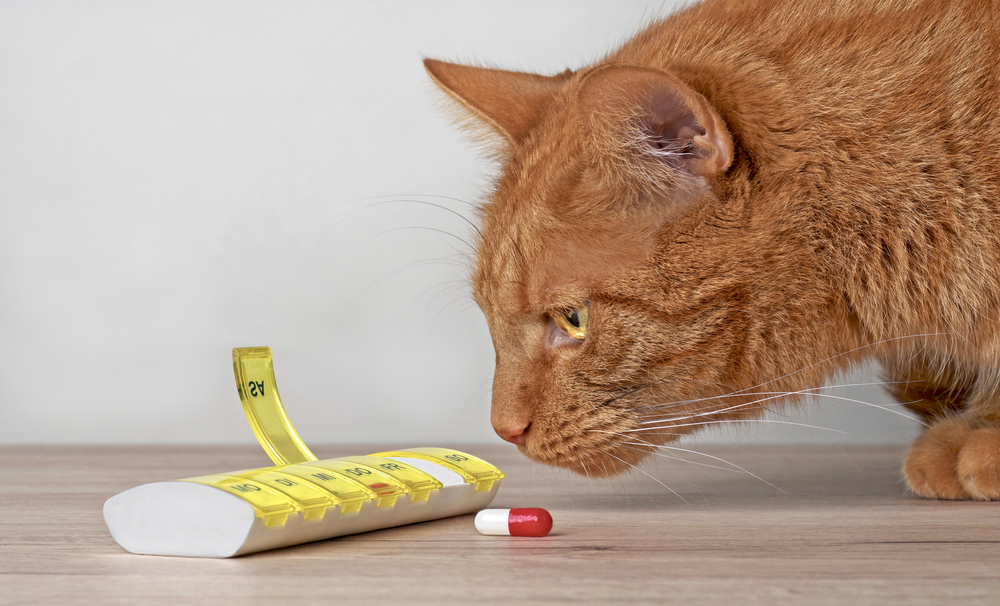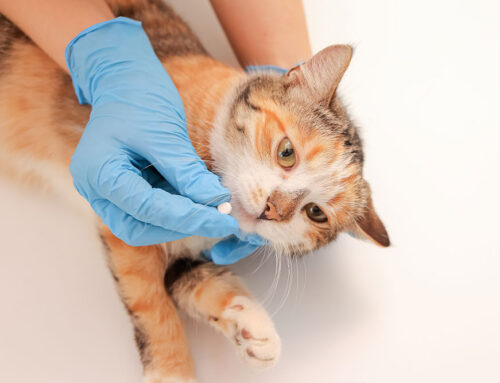The WesVet Animal Hospital team celebrates American Heart Month by taking an in-depth look at the most important body organ—the heart. Every heartbeat sends blood through the entire body, at a rate of 100,000 beats per day, or 350 million beats during a pet’s 10-year life span. Heart disease is one of the leading causes of death among humans, and approximately 10% of dogs and 15% of cats can develop this condition over their lifetime. Here are some facts about heart disease and your pet.
What is heart disease in pets?
The heart consists of four chambers, with two chambers receiving blood used by the body and sending it via blood vessels through the lungs to become oxygenated, and two chambers pumping the fresh blood back out into the body through major arteries. An electrical impulse causes the heart to beat, and blood flows through the chambers with valves that open and close with heartbeat contractions. Pets rarely get coronary artery disease like humans, and instead have progressive changes in their heart muscle, valves, or electrical impulses. Most pets acquire heart disease over time, rather than from birth, and significant heart disease can progress to heart failure.
What are heart disease signs in pets?
Early heart disease has few clinical signs, which makes regular veterinary checkups and watching for abnormal behaviors essential. Pet owners may attribute subtle changes to increasing age, but any pet displaying these signs should be immediately evaluated.
- Lethargy
- Exercise intolerance
- Decreased appetite
- Weight loss
- Increased respiratory rate
- Coughing
- Abdominal distension
- Pale or blue-colored gums
- Fainting or collapsing
What types of heart disease affects pets?
Pets may be affected by a variety of heart conditions, including:
- Heart valve degeneration — Valvular degeneration is common in older dogs, and can cause a backflow of blood through the valves that manifests as a heart murmur.
- Cardiac arrhythmias — Aberrant electrical impulses in the heart can cause an abnormal heart rhythm, with lethargy, fainting, or sudden collapse.
- Hypertrophic cardiomyopathy — Heart walls can become thickened, especially in cats, and can cause heart failure, blood clot formation or sudden collapse.
- Dilated cardiomyopathy — Heart walls can become distended and weakened, especially in large-breed dogs, and can lead to heart failure or sudden collapse.
- Congestive heart failure — Many heart diseases can progress to congestive heart failure, which can cause fluid retention in the lungs or abdomen.
- Heartworm disease — Heartworm disease is transmitted by mosquitoes, and can interfere with blood flow and heart function.
How is heart disease diagnosed in pets?
A veterinarian can detect disruptions in blood flow or heart contractility by listening with a stethoscope for a heart murmur, arrhythmia, or muffled heart sounds. Follow-up diagnostics are needed to fully evaluate your pet’s heart condition.
- Chest X-rays — X-rays allow visualization of your pet’s heart and lungs, to assess heart size, pulmonary vessels, and potential fluid accumulation.
- Echocardiogram — An echocardiogram is an ultrasound of the heart that provides real time observations of your pet’s heart at work. During an echocardiogram, heart wall and chamber size can be measured, and valvular blood flow assessed.
- Electrocardiogram (ECG) — An ECG measures the electrical activity of your pet’s heart, and can provide confirmation of the type and location of an arrhythmia detected during your pet’s exam.
- Blood tests — Blood tests can provide information on your pet’s overall organ function, electrolyte levels, presence of infection, heartworm status, and certain cardiac enzymes and protein levels.
How is heart disease treated in pets?

The goal of heart disease treatment is to slow disease progression and increase your pet’s quality of life. The medications prescribed will vary based on the severity and type of your pet’s specific heart disease. Regular lab work will be needed to monitor your pet’s organ function, and to adjust medications for proper disease management. Treatments may include:
- Diuretics to decrease fluid accumulation
- Vasodilators to improve circulation
- Inodilators to enhance heart contractility
- Antiarrhythmics to stabilize heart rhythm
- Heart-specific diets
- Oxygen therapy
Our WesVet Animal Hospital team recommends regular preventive care visits to ensure an early heart disease diagnosis, and provide an increased chance for a successful outcome. Don’t hesitate to contact us if you have questions about your pet’s heart health, or are concerned that they may be showing signs of heart disease.







Leave A Comment